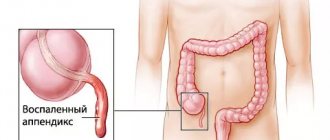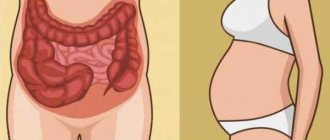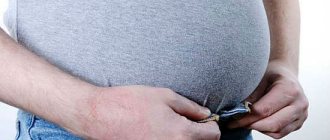Where do gases come from?
Gas formation is a natural process in the digestive system, caused by bacteria on the intestinal walls that help digest food. Gases can not only form in the intestines themselves, but also get there with food. Some of the accumulated gases leave the body through the anus or with belching, while some remain in bubbles attached to the intestinal walls.
The formation of gases is a normal phenomenon, but sometimes their quantity goes beyond the normal limits, which provokes the occurrence of flatulence. Bloating is one of the symptoms that indicates the presence of abnormalities in the gastrointestinal tract, caused either by exacerbation of chronic diseases or dietary disturbances.
Causes of flatulence:
- excess in the diet of legumes, fruits, sweets, vegetables rich in starch;
- unsystematic eating (eating on the run, smoking while eating);
- development of diseases: dysentery, salmonellosis, rotavirus infections;
- the beginning of ovulation.
Help: Bloating can occur in people with food intolerance to certain foods in the diet. By eliminating them, you can get rid of this problem for good.
Bloating is a phenomenon accompanied by discomfort, colic in the lower abdomen, and increased gas production. There is a feeling of fullness in the intestines, the abdomen visually enlarges, and there is a frequent urge to go to the toilet, often accompanied by constipation.
In women, bloating very often occurs either due to irregularities in the diet or during ovulation. It is the last reason that is worth considering in more detail.
Does your stomach always bloat in the middle of your cycle?
Ovulation does not always occur in the middle of the menstrual cycle. In most women, it occurs between 11-21 DC (the period from the 7th to 30th DC can also be a normal variant). It all depends on your duration of the follicular phase (the period of follicle growth), ending with a surge of hormones and the release of UC. Accordingly, ovulatory bloating in a woman appears from the 5th to the 28th DC. I described the female cycle and ovulation in great detail and simply for those planning in this article.
Important(!) There is one general rule for all healthy women: 14-20 days after ovulatory bloating, menstruation should begin (1-2 days for the estrogen surge, 1-2 days for the LH surge, plus 12-16 days while the corpus luteum lives ).
The duration of estrogen production in most cases is one to two days. After LH begins to rise, estrogen production begins to decline and is usually at a minimum by the time of ovulation. However, bloating does not disappear instantly, since it will take more time to remove excess fluid from the tissues and restore normal intestinal function. As a result, ovulatory bloating lasts 1-3 days , no more.
Causes
Ovulation is a natural physiological process in a woman’s body when an egg, ready for fertilization, moves through the fallopian tubes to attach to the wall of the uterus. Bloating is one of the symptoms that inevitably accompanies ovulation. Why does it arise?
It is caused, first of all, by changes in the functioning of the hormonal system of the female body. The hormone progesterone, which actively enters the blood during egg maturation, affects the functioning of the circulatory system and all internal organs. It is progesterone that weakens the muscles of the uterus, preparing the body for a possible pregnancy. Since all the internal organs of the abdominal cavity coexist in symbiosis, the intestinal muscles relax along with the uterus, which leads to the accumulation of gases and the occurrence of flatulence.
During and after ovulation, blood flow to the uterus and, accordingly, the intestines is increased, which is why disturbances in its functioning occur.
The process of release of the egg from the follicle also affects the occurrence of bloating. At this time, the walls of the uterus thicken, putting pressure on the intestinal wall, so the woman’s stomach visually increases, and disturbances in the functioning of the digestive system occur.
During ovulation, in preparation for pregnancy, fluid retention occurs in the body, which causes swelling in both the fingers and toes, and in the abdomen.
The inflammatory process that accompanies follicle rupture is caused precisely by progesterone, which continues to be released after ovulation. Therefore, even after the egg attaches to the walls of the uterus, bloating may occur.
Attention! If bloating occurs before ovulation, it is recommended to consult a doctor. This often happens when the diet is violated or diseases of the genital organs and gastrointestinal tract develop.
The influence of ovulation stages on bloating
The manifestation of symptoms depends on the stages of ovulation. The process of releasing an egg is divided into three stages:
- Preparing the body for the appearance of a mature zygote.
- Direct exit from the follicle.
- Removal from the body through monthly secretions.
Before the process
The appearance of flatulence in the period before ovulation is possible due to a violation of the diet and foods present in the diet. If you pay attention to the menu and eat properly, the pain syndrome will subside and your health will improve. They try to include foods containing fewer carbohydrates in their diet; they can increase gas formation.
During the process
During ovulation, the appearance of unpleasant symptoms is considered normal. This is a natural reaction of the body to the appearance of a ready and mature zygote. Similar symptoms occur when the egg moves through the fallopian tubes directly into the uterine cavity.
After the process
After ovulation, bloating occurs accompanied by pain. Characterized by an aching and pulling sensation.
The release of the zygote is accompanied by numerous damage to the uterus. The passage of this period is extremely painful; for a woman it is considered normal. Doctors try not to focus on this, since the psychological attitude is also important for health. Experiences and a strong emotional reaction can develop spasmodic phenomena in the intestines, which disappear after calm is restored.
Most women have learned to notice the manifestation of ovulation and control the possibility of conception.
What can you do if flatulence occurs? If pregnancy is not confirmed, but pain and bloating are present, swelling of the soft tissues in the lower abdomen additionally appears - this is a signal that you need to see a doctor and get advice.
The diet should be reconsidered. Sometimes poor nutrition does more harm than any disease. A change in the menu, following a diet, and gentle dietary food will allow the gastrointestinal tract to recover and function normally again. Foods that cause increased gas formation should be excluded. Remove sour, fatty, spicy, smoked, alcohol, smoking. Carbonated drinks are among the provocateurs of flatulence.
If you drink chamomile infusion instead of soda, intestinal motility will significantly improve. The product will help remove toxins from the body, having a diuretic effect.
Vitamin B, magnesium, potassium are only welcomed by the body. Deficiency mania has an extremely negative impact on the condition of the intestines. At this moment, salts and water are retained in the body. The stomach is swollen and hurts. A significant deficiency of magnesium in the blood creates stress. It is possible to replenish magnesium reserves with dark chocolate (at least 70% cocoa beans) or by taking a mineral complex with a high magnesium content.
The pain syndrome that occurs during ovulation is provoked by estrogen and prostaglandin. It is enough to exclude alcoholic drinks, caffeine, milk from the menu, hold out for 1 month and monitor your well-being. Taking Omega-3 will reduce the amount of prostaglandin in the body and significantly reduce pain.
What not to eat during periods of pain and bloating:
- Any food products related to legumes. This food is considered heavy, takes a long time to digest and remains in the digestive tract.
- Give up sweets and starchy foods for a while.
- Avoid pickled foods, pickles, and smoked foods on the menu.
- Soda provokes an increase in the amount of gases in the intestines, which further provokes flatulence.
- Potato dishes, fresh cabbage.
- Yeast bread and any product created using yeast.
Try to consume fermented milk, low-fat foods. During any period of the menstrual cycle, physical activity is necessary. You will need to monitor the moderation of loads and avoid severe fatigue.
During this period, it is recommended to engage in calm sports: yoga, stretching. You can swim in the pool, this puts stress on all parts of the body, while relaxing it at the same time. It is advisable to postpone cardio training to a more suitable period. As maintenance medications, it is recommended to take multivitamin complexes with an increased content of B vitamins.
If you follow the recommendation, you can avoid the occurrence of unpleasant sensations or significantly reduce the intensity of the symptoms. Sharp, nagging pains are removed. It is possible that the pain syndrome indicates emerging pathologies of the internal organs of the pelvis.
It is advisable to visit a gynecologist for consultation and diagnostics. After receiving the results, if necessary, treatment is prescribed.
Today, a woman, even without special tests or visiting a doctor, can determine the right day for possible conception, focusing on changes in her body. These changes include bloating on the day of ovulation.
What provokes it?
Bloating during and after ovulation is normal, but can be worrisome due to its associated factors and symptoms.
Important! Intestinal bloating is caused primarily by a lack of magnesium in the body. This is why salts and excess fluid are retained in the intestines.
The discomfort caused by the enlargement of the uterus and, accordingly, the intestines interferes with normal digestion. Therefore, bloating is accompanied by constipation.
What is the process of bloating?
When women reach childbearing age, they are forced to experience ovulation, a monthly process during which conception is possible. If the egg cannot be fertilized, “women’s days” begin.
Ovulation is often called the equator of menstruation. This is explained by the fact that it is a physiological process that occurs exclusively in the female body. It is thanks to her that conception, gestation and birth of a child occur.
The duration and characteristics of ovulation vary. Because of this, every woman experiences it differently.
Bloating is usually only detected after the ovulation process.
If this phenomenon is noticed before or during it, there is a need to undergo a preventive examination. It is important to note that bloating is sometimes a normal reaction of the body, but in some cases it signals a developing pathology.
Nature of pain
During the release of the egg, stabbing pain is observed in the lower abdomen, on the side of the ovary. This happens because the body perceives the release of the egg as a microtrauma and turns on its defense system. With bloating, there is almost always a nagging pain in the lower abdomen, which is moderate in nature. Colic and spasms during bloating caused by ovulation, as a rule, are absent, because this process is not caused by disturbances in the digestive system, but by changes in the volume of the uterus, which puts pressure on the internal organs in the abdominal cavity. Increased gas production caused by the movement of the egg through the fallopian tubes can cause pain, but completely disappears after ovulation.
The main physiological signs of ovulation
Ovulation is a short period of the female cycle that occurs between the follicular and luteal phases. Characterized by the release of a mature egg from the ovary. A woman can identify this process physically by listening to changes in the body. The cell continues to move along the fallopian tube towards the sperm.
Main symptoms of ovulation. How to determine the day of ovulation
Each woman feels the ovulation period somewhat specifically, but there are a number of common signs:
- change in the structure of discharge (abundant, viscous);
- increased sexual desire (in about 48 hours);
- jump in basal temperature;
- changes in the cervix;
- pain in the lower abdomen;
- some bloating during ovulation;
- breast enlargement and tenderness; increased levels of hormones in the blood and urine.
Sign of pregnancy
If after ovulation the egg attached to the walls of the uterus is fertilized, pregnancy occurs. It is during this period that the body begins to prepare for bearing a fetus, against which the first changes occur. They are provoked by the hormone progesterone, which weakens the muscles of the uterus, enlarging it, and at the same time acting on the intestinal walls. A relaxed intestine begins to digest food more slowly and less often pushes digestive products out of the body, so a process of increased fermentation occurs, accompanied by colic, an increase in the size of the abdomen, increased gas formation and constipation. Bloating is inevitable during pregnancy, since changes in the condition of the uterus will in any case affect digestion.
In addition to the fact that bloating can be called one of the most pronounced symptoms of pregnancy, this phenomenon can also be caused simply by indigestion. After all, during pregnancy, taste preferences change, which can also affect digestion. If problems arise with intestinal function and gas formation, it is recommended to make adjustments to the diet.
How to distinguish bloating during ovulation from ordinary intestinal problems
Answer these few questions and you will be able to distinguish flatulence of an ovulatory nature from digestive problems:
- Is this a common situation for me when my stomach presses and bursts ? Are these symptoms frequent or regular in my life? Or bloating occurs rarely - about once a month. If the latter, then it is probably truly an ovulatory sign.
- Is my usual bloating significantly worse now than on other days? For example, I am prone to bloating, but during this period it is especially strong. Has this happened in previous cycles? Wasn't this manifestation about 2 weeks before menstruation? If the answer is yes to all these questions, then it is ovulatory bloat.
- Is there another, obvious explanation for the onset of flatulence (besides ovulation)? For example, a recent change in the way you eat and drink, new foods, a diet, yesterday there was a party with an abundance of sweet, salty, fatty foods, etc.
- Am I constipated now ? A clogged intestine almost always leads to flatulence and discomfort. Unfortunately, if you suffer from constipation, it will be difficult to differentiate between ovulatory bloating and flatulence and digestive problems. The normal frequency of bowel movements is 1–3 times a day. In case of chronic stool retention for up to three days or longer, a woman regularly experiences bloating, flatulence and discomfort in the intestines. If you usually don’t suffer from constipation, but at the moment - yes, most likely, bloating is precisely its consequence (there is a separate chapter on how to cure constipation forever with one cheap product) When there is nothing like that, then ovulation may be approaching.
- How long does flatulence last? During the period of UC release, increased gas formation in the intestines continues for no more than two to three days. It appears as if out of nowhere and quickly disappears, for no apparent reason. If bloating and pain in the abdomen last longer, then this is a clear sign of illness.
Important(!) In addition to problems in the digestive system, prolonged flatulence is sometimes a symptom of gynecological diseases such as PCOS, ovarian cyst or endometriosis. Here you will need advice from a specialized specialist.
It is also necessary to immediately consult a doctor if, along with bloating, severe, sharp pain in the lower abdomen appears (may be accompanied by high fever or vomiting).
How to avoid?
In order not to encounter one of its most unpleasant symptoms during ovulation - bloating and increased gas formation, it is recommended to use the following preventive measures:
- taking vitamins containing magnesium citrate;
- making adjustments to the diet: excluding legumes, rye bread, carbonated drinks, alcohol;
- increased physical activity before ovulation;
- taking decoctions based on medicinal herbs: lemon balm, calendula, chamomile.
Help: Vitamin teas (cranberry, lingonberry) and infusions of medicinal herbs help not only get rid of bloating during ovulation, but also alleviate other symptoms, and also tone the body and prevent diseases of the internal organs.
During ovulation, antispasmodic and anti-inflammatory drugs can be taken to reduce pain.
Stomach ache after ovulation
Representatives of the fair sex experience cyclical changes throughout their childbearing years. This physiological process is regulated by the endocrine system. Under the influence of sex hormones, the egg matures and is released into the abdominal cavity, and then, through the tubes, it moves to the uterus.
With the help of endocrine glands, the body prepares for conception and further gestation. If the birth of a new life does not occur, menstruation occurs. Bleeding from the genital tract indicates that pregnancy has not occurred and the endometrium is rejected.
The ovulatory cycle is regulated by hormones, the levels of which vary throughout the month. However, the active substances synthesized by the glands affect not only the reproductive system, but also the entire body.
Therefore, many women experience individual changes. Most often, girls are bothered by bloating after ovulation.
This phenomenon is observed in 90% of cases and is often symptomatic.
Presumable signs of ovulation
In most cases, changes in the female body go unnoticed by the woman. And the appearance of flatulence is more often associated with errors in nutrition. However, if you listen to yourself, you can accurately predict the period when a mature egg is released. There are additional signs that accompany the ovulation process:
- Increase in abdominal volume.
- The appearance of copious vaginal discharge, including cervical mucus, which has a thick consistency and a white tint.
- Increased libido.
- Psycho-emotional lability.
- Changes in taste sensations while eating.
- Swelling of the mammary glands and nipples.
- Painful sensations of a short-term nature, mainly from the side of the release of the egg from the ovary.
- Swelling of soft tissues, most often of the face and limbs.
- Changes in basal temperature in the form of an increase in the number of degrees.
Important! Symptoms that occur during ovulation may accompany pregnancy. Therefore, it will be possible to verify successful conception only 2-3 weeks after the first signs appear.
Cause of flatulence during ovulation
The main cause of flatulence is hormonal changes that occur in the second half of the monthly cycle, under the influence of progesterone.
The hormone affects the tone of smooth muscles and weakens peristalsis.
Therefore, its motor function is disrupted and fermentation is noted under the influence of microflora, which leads to increased gas formation in the intestinal lumen and bloating during and after ovulation.
If discomfort or heaviness appears in the lower abdomen after ovulation, this phenomenon is most often associated with hormonal changes. In this case, the symptoms will be temporary and disappear within a few days.
In some women, the symptoms are more pronounced and cause psychological and physical discomfort. In such situations, you should undergo an examination to exclude pathologies from the reproductive system and gastrointestinal tract.
The doctor will help you choose medications that relieve pain and reduce the manifestations of flatulence. When your stomach ache after ovulation, especially for a long period of time, you need to urgently consult a specialist.
Attention! An unfavorable symptom of an increasing nature may be a sign of a surgical disease, such as ovarian apoplexy. In this case, surgery is the only solution to the problem.
Bloating before ovulation is not typical for physiological fluctuations in hormones that regulate the menstrual cycle. It is advisable to interpret such changes as disorders of the digestive system.
Dynamic observation will determine the presence of an acute or chronic process. If vomiting, nausea, loose stools and fever occur, an intestinal infection should be excluded.
If the symptoms do not worsen, it is necessary to adjust the diet.
Preventive methods for eliminating flatulence
Flatulence causes discomfort to a woman, especially if she leads a socially active lifestyle. Therefore, representatives of the fair sex are interested in how to eliminate and alleviate the signs of bloating. To do this, you should first seek help from specialists.
Important! It is necessary to exclude diseases of the gastrointestinal tract and pelvic organs that will require serious drug therapy.
If pathological changes are not identified, you can resort to the following preventive measures:
- menu correction;
- physical exercise.
Diet features
The first step towards reducing flatulence is a proper diet. During the period of expected ovulation, it is better to exclude foods that cause increased gas formation in the intestines. These include the following foods:
- legumes;
- fresh or sauerkraut;
- yeast confectionery products;
- potato;
- smoked meats;
- pickled and salty dishes;
- carbonated drinks;
- tea and coffee in large quantities;
- alcohol.
During the period of ovulation, it is better to consume fermented milk products, fruit and vegetable juices. Meat and fish should be steamed, avoiding spicy seasonings. In order to reduce negative symptoms, you need to additionally include vitamins and mineral complexes.
Preference should be given to herbal decoctions that reduce bloating. The following are well suited for these purposes: chamomile, fennel, thyme, mint. Plant extracts not only reduce unpleasant symptoms, but also have a beneficial effect on the nervous system - soothe, relieve stress and fatigue.
Sports loads
Moderate physical activity eliminates signs of heaviness in the abdomen. A specially selected set of exercises strengthens the muscles of the anterior abdominal wall and helps normalize intestinal motor function.
During the period of ovulation, heavy sports activities should be avoided. Excessive stress can negatively affect the ovulatory cycle. It is necessary to give preference to sports that have a gentle and harmonious effect on the body. Such exercises include the following options:
- swimming;
- yoga;
- slow walking and jogging;
- gymnastics.
Medication assistance
However, sometimes it is not possible to cope with the manifestations of bloating using preventive methods. Therefore, in such cases, the doctor may recommend the use of several groups of drugs to reduce gas formation. Such means include the following:
- Defoamers are drugs based on dimethicone and simethicone. The active substance is not addictive, has no systemic effect and acts only on the wall of the gas bubble, destroying it.
- Sorbents - reduce fermentation processes in the intestines and have enveloping properties.
- Herbal preparations - contain extracts of fennel, chamomile, coriander, which have a carminative effect.
Finally
Bloating during ovulation is a physiological condition that can now be successfully corrected. Compliance with preventive measures allows a woman to get rid of unpleasant symptoms and lead an active lifestyle.
Source: https://1beremennost.com/ovulyatsiya/meteorizm-posle-ovulyatsii









